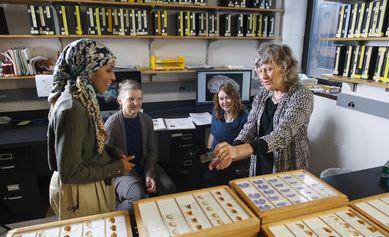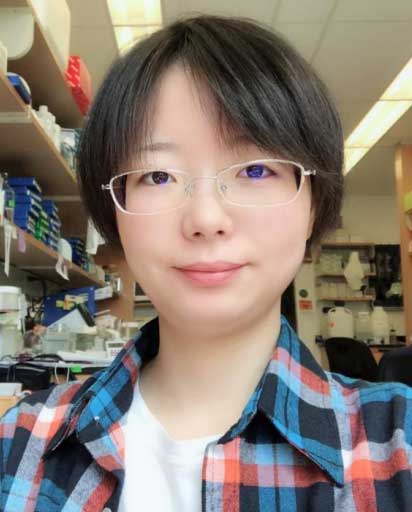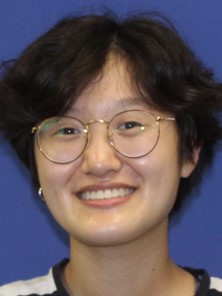Congrats to both Nada and Chidozie! Chidozie Okoye and Nada Ahmed Selim present at SfRBM 2022.
Monday, November 28, 2022
The work by Chidozie Okoye and Nada Ahmed Selim were both selected for presentations at the Society for Redox Biology and Medicine's 29th Annual Conference (SfRBM 2022) and Chidozie was awarded a travel award.


Congratulations to Romeo Blanc on his new NIH Pathway to Independency Award!
Wednesday, August 10, 2022
With the support of mentors (including professors Robert Dirksen, Lynne Maquat and Laura Calvi, pictured below, and Vera Gorbunova and Paula Vertino),he'll study the processes that lead to stem cell dysfunction as we age.
Major Grant Funds Research to Understand Key Features of OCD: Inflexibility and Avoidance
Tuesday, May 24, 2022

With $15.6 million from the National Institute of Mental Health, scientists will investigate the brain networks central to obsessive compulsive disorder in order to guide the development of effective treatments. A team of scientists from across the country will use a $15.6 million award from the National Institute of Mental Health to investigate the brain networks central to obsessive compulsive disorder (OCD). The work will build on more than 15 years of research by lead investigator Suzanne N. Haber, Ph.D. and collaborators to understand the underlying biology of the disease and guide the development of effective treatments.
“Obsessive compulsive disorder is among the most disabling psychiatric disorders,” said Haber, professor of Pharmacology and Physiology, Neuroscience and Psychiatry at the University of Rochester School of Medicine and Dentistry. “It affects one to three percent of the population worldwide, yet it hasn’t received the same level of attention as other mental health disorders. We’re excited to receive this funding and use translational methods to understand circuit dysfunction in the disease and to develop new treatment approaches that can improve the lives of patients.”
The five-year grant funds a Silvio O. Conte Center for Basic and Translational Mental Health Research at the University of Rochester. Haber has received previous Conte Center grants that have propelled scientists’ understanding of the disease. Major findings include the discovery of a narrower, more defined network of brain regions that underlie the disorder. Dubbed the ‘OCD network,’ the new grant will allow scientists to test the idea that behavioral inflexibility in OCD results from faulty connections between brain circuits in this network.
Read More: Major Grant Funds Research to Understand Key Features of OCD: Inflexibility and AvoidanceCongratulations to Dr. Chongyang Zhang as this year’s recipient of the prestigious Vincent du Vigneaud Award!
Wednesday, May 11, 2022

Congratulations to Dr. Chongyang Zhang as this year’s recipient of the prestigious Vincent du Vigneaud Award for a Ph.D. thesis judged to be unique for stimulating and extending research in the field. This university-wide competition is conducted annually and is highly competitive. Dr. Chongyang Zhang performed her doctoral thesis research in the laboratory of Dr. Chen Yan at the Aab Cardiovascular Research Institute (CVRI). The focus of her dissertation was the study of abdominal aorta aneurysm (AAA), a life-threatening disease characterized by weakening or bulging in the main artery supplying blood to the abdomen and legs.
Chongyang identified a novel role of cyclic nucleotide phosphodiesterase 1C (PDE1C) in vascular smooth muscle cell senescence and AAA formation and provided pharmacological evidence of PDE1 inhibitors in the suppression of AAA progression in animal models. Chongyang was also the first to show that inhibiting PDE5 by Viagra aggravated experimental AAA, which may raise a caution for clinical usage of Viagra in aneurysmal patients. These studies led to four first-author publications. Among them, one publication came with American Heart Association (AHA) News Release, indicating the importance and significance of her study. She was also awarded a prestigious AHA Predoctoral Fellowship and AHA Early Career Investigator Award.
Congratulations Winni on publishing your Medical Pharmacology master’s essay!
Thursday, May 5, 2022

Mechanical factors play critical roles in the pathogenesis of joint disorders like osteoarthritis (OA), a prevalent progressive degenerative joint disease that causes debilitating pain. Chondrocytes in the cartilage are responsible for extracellular matrix (ECM) turnover, and mechanical stimuli heavily influence cartilage maintenance, degeneration, and regeneration via mechanotransduction of chondrocytes. Thus, understanding the disease-associated mechanotransduction mechanisms can shed light on developing effective therapeutic strategies for OA through targeting mechanotransducers to halt progressive cartilage degeneration.
Mechanosensitive Ca2+-permeating channels are robustly expressed in primary articular chondrocytes and trigger force-dependent cartilage remodeling and injury responses. This review discusses the current understanding of the roles of Piezo1, Piezo2, and TRPV4 mechanosensitive ion channels in cartilage health and disease with a highlight on the potential mechanotherapeutic strategies to target these channels and prevent cartilage degeneration associated with OA.
Winni Gao, Hamza Hasan, Devon E. Anderson, Whasil Lee. The Role of Mechanically-activated Ion Channels Piezo1, Piezo 2, and TRPV4 in Chondrocyte Mechanotransduction and Mechano-Therapeutics for Osteoarthritis. Front. Cell Dev. Biol. 04 May 2022 | https://doi.org/10.3389/fcell.2022.885224.